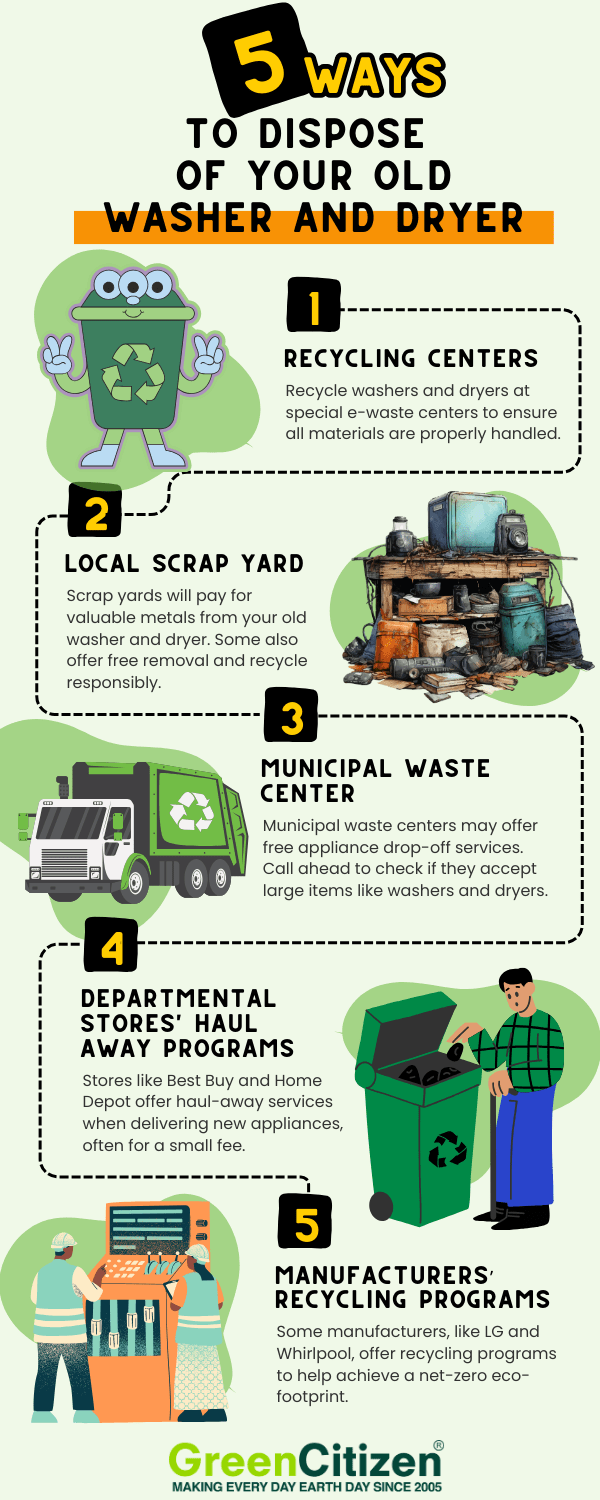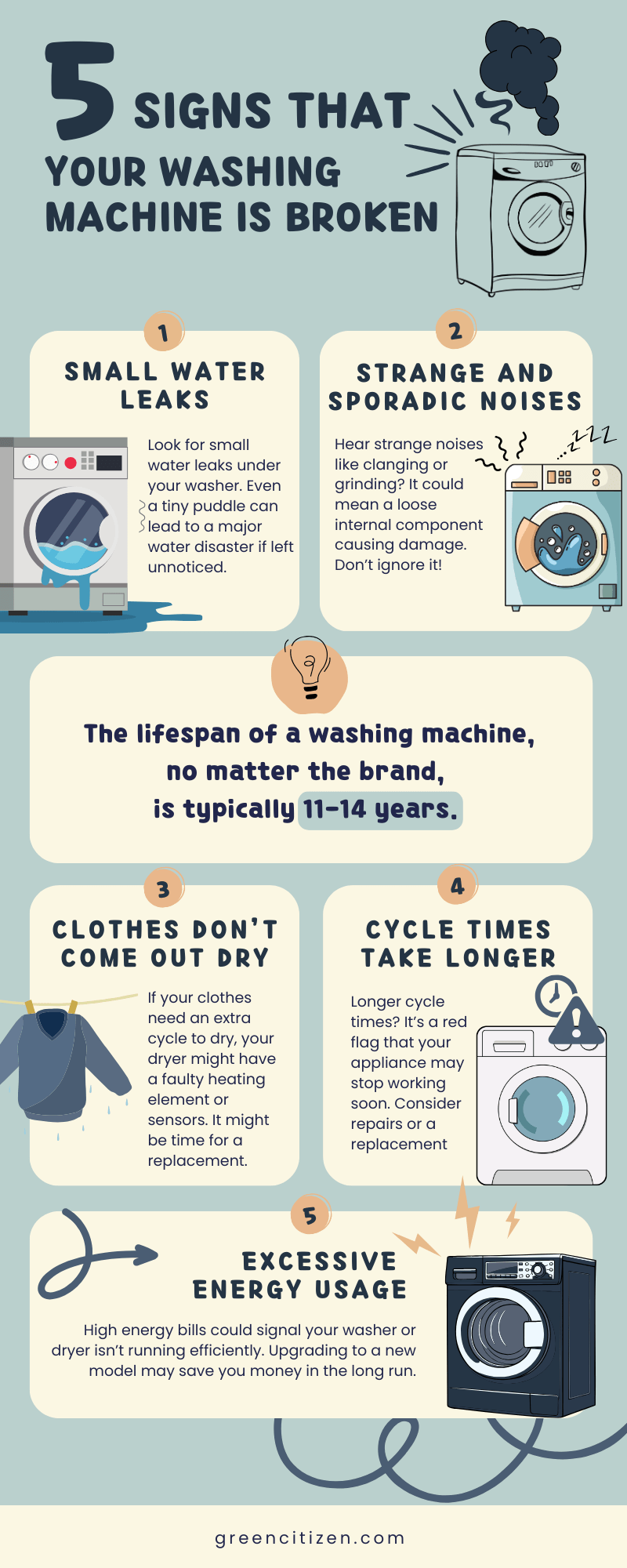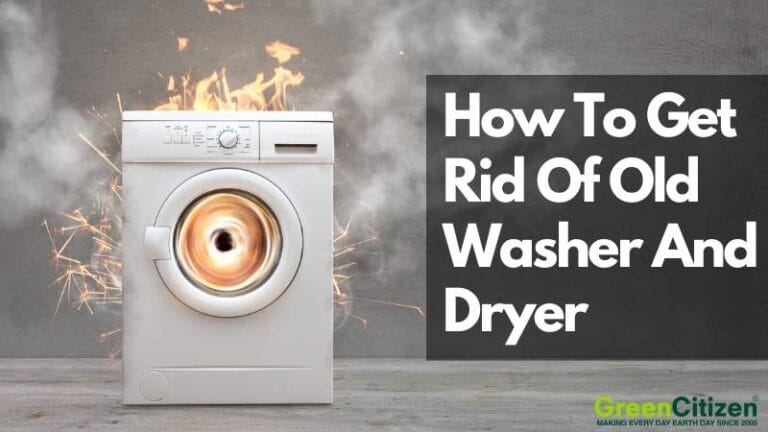Disposing of an old washer and dryer isn’t as simple as leaving them on the curb. These large appliances contain valuable materials like steel, copper, and aluminum — but they also house hazardous substances, including mercury, lead, and cadmium. If not handled properly, they can harm the environment.
Recycling your washer and dryer keeps these toxic elements out of landfills, conserves natural resources, and helps reduce greenhouse gas emissions. Many recycling centers and appliance removal services can ensure your old units are handled safely and responsibly.
If you’re wondering where to start, this guide will walk you through the best ways to dispose of your washer and dryer — from recycling and donation to professional pick-up services.
Key Takeaway: How to Dispose of a Washer and Dryer
The best way to dispose of an old washer and dryer is through certified recycling programs, scrap yards, retailer haul-away services, municipal waste centers, or donation. These options ensure your appliances are handled responsibly, sustainably, and legally — protecting the environment and recovering valuable materials.
How to Responsibly Get Rid of Your Washer and Dryer: 6 Practical Solutions
Getting rid of a washer and dryer isn’t as simple as putting them out with your regular trash — and in most places, it’s illegal to do so. These bulky appliances require special handling, recycling, or removal services to ensure they don’t end up in landfills.
Here are the six best ways to dispose of an old washer and dryer responsibly — from certified recycling to donation.

1. E-Waste Recycling Centers: The Safest and Most Responsible Option
The best way to dispose of an old washer and dryer is through a certified e-waste recycling center. These facilities specialize in handling large household appliances, ensuring that valuable materials like steel, copper, and aluminum are properly recovered. More importantly, they know how to process harder-to-recycle components — including rubber tubes, plastic parts, electronics, and cables — using specialized methods that break them down into reusable materials.
Unlike unreliable junk removal services, certified e-waste recycling programs follow strict environmental guidelines to prevent harmful materials from ending up in landfills. These centers separate appliances into various recyclable components through eco-friendly, regulated processes.
To find washer and dryer recycling near you, use our Green Directory. Simply enter your zip code to locate reputable and accredited appliance recycling services in your area.
Choosing a certified recycling center ensures your washer and dryer are disposed of responsibly, sustainably, and safely.

2. Scrap Yards: Turn Your Old Washer and Dryer Into Scrap Metal
Another option for recycling an old washer and dryer is through a local scrap yard. These facilities specialize in recovering valuable metals like steel, copper, and aluminum from large appliances. Many scrap yards dismantle washers and dryers on-site, separating recyclable metals from plastic and electronic waste. In some cases, they partner with e-waste recycling centers to handle non-metal components responsibly.
Some scrap yards may offer free appliance removal services or small cash payments based on the metal value of your washer and dryer. While you might not earn much, this option can save time and eliminate the hassle of transportation.
Important: Before choosing a scrap yard, confirm that they follow environmentally responsible disposal practices and don’t send hazardous materials to landfills.
3. Municipal Waste Centers: A Convenient Local Option for Appliance Disposal
Many municipal waste centers offer programs for disposing of large household appliances like washers and dryers. However, most cities and counties prohibit leaving appliances curbside with your regular trash — doing so could result in fines.
Instead, municipal facilities typically provide designated drop-off services for appliances. In many areas, this is a free service if you transport the washer or dryer yourself. Some municipal programs also offer scheduled appliance pick-up services for a small fee or as part of seasonal clean-up events.
Before visiting, check with your local waste management center to confirm their appliance recycling policies and ensure your old washer and dryer will be handled properly.
4. Retailer Haul-Away Programs: An Easy Way to Recycle Old Appliances
Major department stores and appliance retailers offer haul-away services to remove your old washer and dryer when delivering new appliances. Retailers like Best Buy, Home Depot, and Costco commonly provide this service, either as part of their delivery package or for a small additional fee.
These programs ensure your old appliances are collected and routed through proper recycling or disposal channels. Retailers typically partner with licensed e-waste recyclers, appliance recycling companies, or manufacturers who reclaim old units for responsible recycling.
Choosing a retailer’s haul-away service is a convenient, hassle-free way to ensure your washer and dryer are disposed of in an eco-friendly and compliant manner.
5. Manufacturer Recycling Programs: A Responsible Disposal Option
Some appliance manufacturers, including LG, Bosch, and Whirlpool, offer dedicated recycling and take-back programs for old washers and dryers. These initiatives support corporate sustainability goals, helping manufacturers reduce waste and promote responsible product lifecycle management.
In many cases, manufacturers provide free appliance collection services when you purchase a newer, more energy-efficient model. These programs ensure your old washer and dryer are recycled properly through certified e-waste channels or refurbished for parts recovery.
Tip: To find out if your appliance brand offers recycling services, visit their website or contact their customer support team directly.
6. Donate Your Washer and Dryer: Extend Their Life and Help Others
If your washer and dryer are still in good working condition, consider donating them to charity. Organizations like The Salvation Army accept gently used appliances that are fully operational and in good cosmetic shape. Donating helps extend the life of these machines and provides affordable appliances to people in need.
In addition to The Salvation Army, many local charities, thrift stores, and community organizations offer free appliance pickup services. Donating is an eco-friendly alternative to disposal and ensures your old washer and dryer continue to serve a purpose.
Contact nearby charities to confirm donation guidelines and arrange collection.
TL;DR: Best Ways to Dispose of Washer and Dryer
The best ways to dispose of an old washer and dryer include e-waste recycling centers, scrap yards, municipal waste programs, retailer haul-away services, manufacturer take-back programs, and donation. These disposal methods ensure your washer and dryer are responsibly recycled, reused, or safely removed.
Can You Recycle a Washer and Dryer?
Yes, you can recycle both washers and dryers through certified e-waste recycling programs. These appliances contain valuable materials like steel, copper, and aluminum that can be recovered and reused. Responsible recycling prevents hazardous components from ending up in landfills and ensures environmental compliance.
Options for washer and dryer recycling include municipal waste programs, appliance recycling centers, scrap yards, retailer haul-away services, and manufacturer take-back programs. These services follow strict guidelines to safely dismantle and recycle large appliances.

Can You Leave a Washer or Dryer at the Curb?
No, you should not leave a washing machine or dryer at the curb for disposal. In most cities, curbside disposal of large appliances is illegal and can result in fines. These items pose environmental risks and require proper handling through recycling programs or authorized removal services.
Always check with your local waste management provider for specific guidelines on washer and dryer disposal to stay compliant and eco-friendly.
Can You Get Rid of a Washer and Dryer for Free?
Yes, there are several ways to dispose of an old washer and dryer for free. Retailers often offer free haul-away services when delivering new appliances. Scrap yards may collect them at no charge to recover valuable metals.
Many municipal waste programs provide free large appliance pick-up on designated days. If your appliances still work, donating to organizations like The Salvation Army or Habitat for Humanity is a free and eco-friendly option. You can also list appliances for free on Craigslist or Freecycle for local pickup.
How to Tell If Your Washer and Dryer Are Broken
It’s not always obvious when it’s time to say goodbye to your washer and dryer. While a complete breakdown — like a machine refusing to turn on — is hard to miss, many early warning signs can tell you these appliances are no longer running efficiently, safely, or economically.
If your washer or dryer is more than 10 years old, recognizing these signs early can help you avoid expensive repairs, wasted energy, and potential household damage. Below are the most common indicators your appliances are on their way out.

1. Water Leaks
Even small leaks beneath your washing machine shouldn’t be ignored. These leaks can cause long-term water damage to floors, encourage mold growth, and lead to costly cleanup efforts.
Leaks often come from worn hoses, cracked seals, or deteriorating water pumps — all signs of age or wear. If these issues persist despite basic maintenance, replacing the washer is usually more cost-effective than continual repairs.
2. Unusual Noises During Operation
All washers and dryers make noise, but sudden new sounds — like grinding, banging, or screeching — usually indicate mechanical problems.
Clanging sounds often point to loose drums or mounts. Grinding noises could mean failing bearings or worn-out belts. These issues can escalate quickly and lead to further internal damage if not addressed.
When noise issues appear in older units, replacement is typically smarter than an expensive repair that may only buy a little more time.
3. Ineffective Drying or Washing Performance
If your dryer leaves clothes damp after a full cycle or your washer doesn’t clean as effectively as it once did, this could signal problems with key components like heating elements, moisture sensors, or agitators.
Not only does this lead to frustration and wasted time, but re-running cycles wastes water and energy. Repairs might be possible, but in aging appliances, these issues often point to broader system inefficiencies.
4. Extended Cycle Times
When wash or dry cycles start taking significantly longer than they used to, it’s often a sign that something isn’t working efficiently — whether it’s heating, draining, or spinning.
Excessively long cycles drive up your utility bills and indicate the machine is straining to operate as it should. This wear and tear frequently leads to breakdowns if left unaddressed.
5. Unexplained Increases in Energy Usage
Older washers and dryers naturally use more electricity than newer models, but sudden spikes in your utility bills could mean something’s failing internally. Faulty thermostats, damaged seals, or worn-out components can cause these appliances to work harder — and burn more energy — to achieve the same results.
If you’re using your machines regularly and your bills jump, it’s worth considering an upgrade to newer, energy-efficient models.
When to Repair vs. Replace: Washer and Dryer
A good rule of thumb:
If the repair cost exceeds 50% of the price of a new machine, replacement is usually the better investment. Older appliances are also less energy-efficient, so even a repair might not make financial sense long-term when you factor in water and electricity savings.
Additionally, modern washers and dryers offer better efficiency, shorter cycles, and eco-friendly features that reduce your environmental impact.
Why It’s Important to Recycle Your Old Washer and Dryer Responsibly
When replacing a washer or dryer, many people focus on buying models that use less water and energy — but fail to consider the environmental impact of improperly discarding their old machines.
Appliances like washers and dryers contain valuable materials such as steel, copper, and aluminum, all of which can be recovered through responsible recycling. However, without proper disposal, these machines often end up in landfills, contributing to growing e-waste problems and environmental pollution.
According to industry estimates, millions of tons of discarded appliances end up in landfills each year — a significant waste of resources that could otherwise be recycled and reused. These materials, if not properly processed, can also release harmful substances into the soil and water.
By choosing certified recycling programs, you help conserve natural resources, reduce landfill waste, and support a more sustainable, circular economy. Recycling ensures these appliances are dismantled safely and responsibly, preventing environmental harm.
EPA reports that durable goods, which include large appliances like washers and dryers, comprised over 57 million tons of municipal solid waste in 2018 — most of which ended up in landfills.
Ready to Recycle Your Washer and Dryer Responsibly?
Finding a responsible, certified appliance recycling service ensures your old washer and dryer are properly handled — protecting the environment and keeping hazardous materials out of landfills.
Skip unreliable junk haulers. Instead, use GreenCitizen’s Green Directory to locate trusted, certified e-waste recycling services near you. Simply enter your zip code and select the service you need.
With the Green Directory, you can confidently choose eco-friendly, compliant, and responsible appliance disposal solutions.

